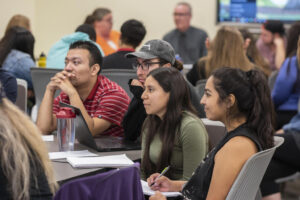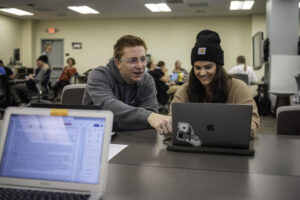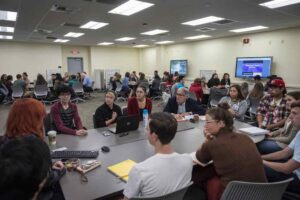
Since the fall of 2017, faculty members Jen Wilking and Susan Roll have co-taught an interdisciplinary course in Political Science and Social Work which invites students to explore how research informs policy at the local level using the central tenets of community-based participatory research (CBPR) and focusing on the issues of housing and homelessness. The course has had various iterations over the years as Jen and Susan continue to explore and refine benefits for students, the campus, and the broader community.
 CBPR naturally encourages the breaking down of disciplinary boundaries and fosters collaboration with the local community. Also called justice research, CBPR utilizes individuals with lived experience as research partners at every step of the process, which not only informs authentic and sustainable outcomes, but builds community partnerships which are necessary for solving such complex problems as homelessness. Additionally, research suggests that integrating both CBPR and interdisciplinarity into courses is especially impactful for student empowerment, civic engagement, and ability to apply course concepts to real world problems.
CBPR naturally encourages the breaking down of disciplinary boundaries and fosters collaboration with the local community. Also called justice research, CBPR utilizes individuals with lived experience as research partners at every step of the process, which not only informs authentic and sustainable outcomes, but builds community partnerships which are necessary for solving such complex problems as homelessness. Additionally, research suggests that integrating both CBPR and interdisciplinarity into courses is especially impactful for student empowerment, civic engagement, and ability to apply course concepts to real world problems.
More about Interdisciplinary Teaching & CBPR
Several features of this course have made it a powerfulinnovation. First, it immerses students deeply in the local community. Students learn about the salient issue of homelessness from community members and services providers, and listen to the needs for data and research from these individuals. Students then design and implement research to address these data needs. Students also engage in service work at local homeless centers and shelters, and present their research findingsand policy recommendations publicly. Research shows clearly that students who participate in civic engagement learn more academic content, develop higher-order skills, and show increased emotional intelligence and motivation for conscientious community action (Dunbar et al 2013; Dutton et al. 2015; Jung 2017; Kornbluh et al. 2020). 
Another powerful driver of student learning in this course is interdisciplinarity. Interdisciplinary teaching, in which students analyze material from more than one perspective, has been shown to increase students’ cultural sensitivity and to enhance learning, especially critical thinking skills, more than traditional singular subject teaching approaches. Student outcomes for the course support the research that informed it. In each of the classes, student performance was the same or higher than in previous un-linked versions of the course. More significantly, learning appears to have been deeper and more valued. In qualitative interviews, students expressed growth in their understanding of (1) the complexity of the problem of homelessness, including interrogating their preconceived notions; (2) how to apply research to address real-world issues; and (3) the importance of interdisciplinary work and perspectives. These interviews also demonstrated a stronger sense of personal agency in responding to social problems:
-
- “I’m from a small town, so if there was a homeless problem I didn’t really see it. So, I didn’t know much about homelessness, and what it even looked like. It was a really important class for me to take, I gained a lot of insight on that problem.”
Students also articulated a greater understanding of and confidence in conducting applied research:
-
- “This class gave me confidence to do research, and it’s not something you have to do on your own. How you format the question is so important, and it’s not something I really thought about before. It was cool to see how much feedback goes into that.”
Perhaps most importantly, students discovered meaningful purpose for their coursework and its connection to their career goals.
-
- “We got to practice what we were learning and bring it back and make it into a real-thing. Every part of it was growth and new. Finally, being able to put all we knew into one place and do something.”
More outcomes of this pedagogical research can be found in Kornbluh, M., Roll, S., Wilking, J., Banks, L., Candela, J. & Stone, H. (2020). Learning and Doing Together: Student Outcomes from an Interdisciplinary, Community-Based Research Course. Journal of Community Engagement and Scholarship. 13(1) 1-14.
In 2021, Jen and Susan were honored with the Community-Engaged Scholars Award at Chico State, and the Faculty Innovation and Leadership Award from the CSU Chancellor’s Office.
